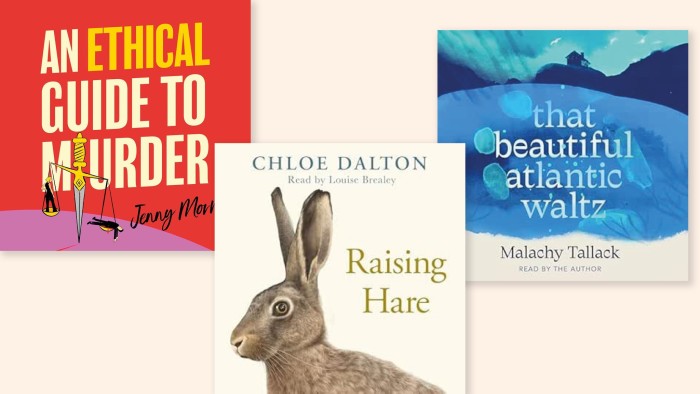Summarize this content to 2000 words in 6 paragraphs in Arabic Unlock the Editor’s Digest for freeRoula Khalaf, Editor of the FT, selects her favourite stories in this weekly newsletter.I have been snowed in, and can report that an audiobook is excellent accompaniment to both the business of excavating the freezer in the hunt for stew ingredients and to shovelling great drifts of the white stuff off the paths so that the household pets may perform their ablutions in relative comfort. Here, at the beginning of a distinctly nippy 2025, is what I’ve enjoyed thus far.Perhaps the temporary isolation in already quiet rural surroundings meant that I was particularly receptive to the mesmerising rhythm of Malachy Tallack’s novel That Beautiful Atlantic Waltz (ZE Press 7hrs 54mins), which tells the story of a solitary Shetlander, Jack Paton, who is contemplating the beginning of his sixties in the traditional manner: looking backwards. Tallack reads the book himself, and ably captures his protagonist’s sense of being becalmed, Jack’s story’s most dramatic features — his parents’ lives, and indeed deaths, at sea, and his own wistful attachment to the country music of America — either firmly in the past or at an unattainable distance. As Tallack recounts the far more vivid and precarious episodes occasioned by the whaling industry, there’s a tangible sense of the awe and terror that extreme weather provokes, and a sharp contrast to the sedate routines of Jack’s everyday life. Naturally, the narrative demands that his fortress of solitude be breached — and that, too, provides another register, as a young neighbour and abandoned kitten appear on the scene.While I was in the frame of mind to consider both the faraway and the benefits of communing with species other than our own, I also listened to farmer and author James Rebanks’s The Place of Tides (Penguin Audio 7hrs 26 mins), an account of his time spent on a Norwegian island with an elderly woman devoted to the care of eider ducks. Narrated with sensitivity and perception by Bryan Dick, who has read Rebanks’s previous books, it’s both detailed and gritty, and extremely moving: a portrait of a place, person and time approaching an immense change. In a semi-similar vein, but with more of the vigour of a way of life beginning rather than concluding, I was also impressed by actor Louise Brealey’s rendition of Chloe Dalton’s Raising Hare (Canongate 6hrs 29mins), in which she conveys all the trepidation of change felt by Dalton as she quit London for the countryside and found herself unexpectedly responsible for a leveret.After this companionable trio, I needed a change of pace, and found it in a clutch of suspense novels, which I listened to between the vast 40-hour-plus undertaking of Miriam Margolyes’s reading of Bleak House, by no means a new recording but one that I mention because the harmony between narrator and material is almost unsurpassable (Margolyes might have been born to describe fog, or embody the blithe hypocrisy of Mrs Jellyby). Back to the thrillers: I was fortunate enough to have an early listening copy of Gillian McAllister’s Famous Last Words (Penguin Audio 12hrs 45mins), which is published at the end of this month. It centres around a woman whose husband goes Awol only to resurface at the scene of a siege, not as a hostage but as a hostage-taker. Emilia Fox reads, switching between perspectives — distraught wife, besieged victims, a hostage negotiator suddenly thrust into the limelight — in the novel’s first act, and then maintaining the tension as the story progresses some years later. Also out in the middle of this month is Jenny Morris’s ingenious An Ethical Guide to Murder (Simon & Schuster (12hrs 43mins), narrated energetically by Nicky Diss. At its heart is a fantastical proposition and an equally unlikely character: Thea, who has the ability to tell how long you’re going to live and, if you’re not one of the good guys, to subtract your remaining years and give them to someone more deserving. The novel’s momentum — and its fun — comes from Thea’s qualms, and her consequent attempts to work out a set of rules to govern the use of her superpower.And finally, something entirely different. The African-American writer Zora Neale Hurston, who died in 1960, is probably best known for her novel Their Eyes Were Watching God, but she also left behind her an unfinished work: a fictional retelling of the life of Herod. Over 60 years later, The Life of Herod the Great (HQ 12hrs 7mins) has been brought to a form of fruition by scholar Deborah G Plant, and is available in audio. I was drawn to it partly through curiosity — it’s so different to much of her work, although she also wrote a version of the life of Moses — but also because it’s narrated by two extraordinary performers, Blair Underwood and Robin Miles. It makes for a bracing, enlivening audio experience, as Hurston lays out the case for the defence of Herod — arguing that his portrayal throughout history has played fast and loose with the evidence and overlooked his record as a benevolent leader. Underwood and Miles read with great gusto and conviction, mirroring Hurston’s ability to weave folklore and mythology into story, and to animate figures both familiar to us and utterly unknown.Join our online book group on Facebook at FT Books Café and follow FT Weekend on Instagram and X
rewrite this title in Arabic Best new audio books for a cold winter’s day
مقالات ذات صلة
مال واعمال
مواضيع رائجة
النشرة البريدية
اشترك للحصول على اخر الأخبار لحظة بلحظة الى بريدك الإلكتروني.
© 2025 جلوب تايم لاين. جميع الحقوق محفوظة.




